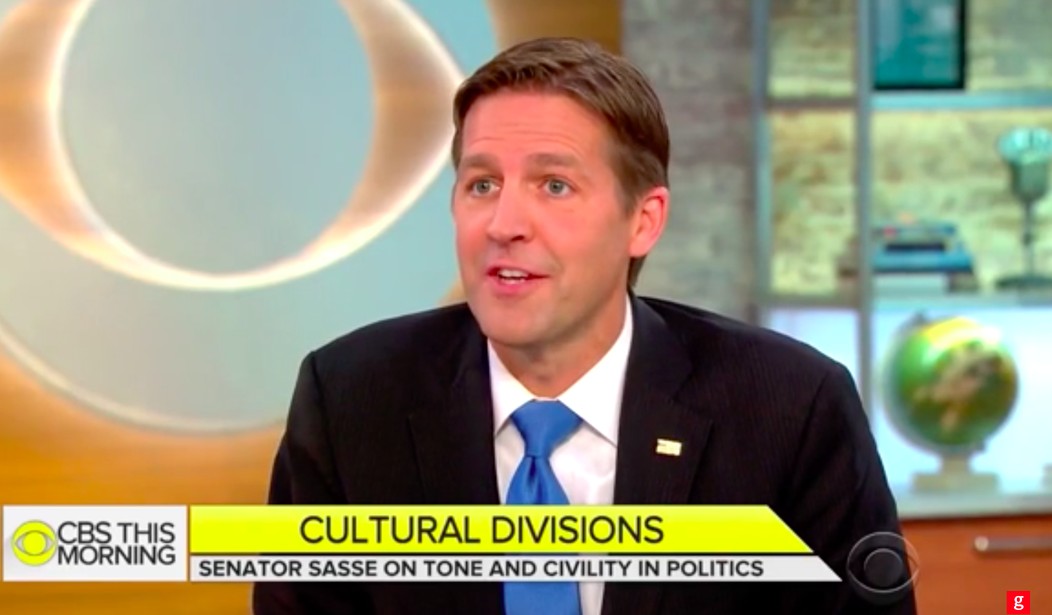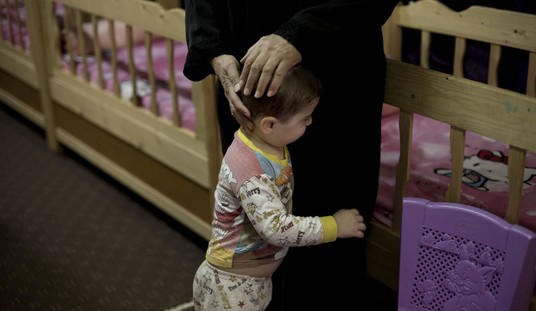On Monday, Sen. Ben Sasse (R-Neb.) warned that America’s cultural problems supercharge political tribalism, and that the problem is likely to grow worse before it gets better. The senator even compared the present animosity to the Civil War, a tragically apt comparison considering the increasing incivility and pass protests.
“I think we’re headed to a deeper, darker, tribal place for a time,” Sasse told CBS “This Morning.” He spoke about his new book “Them: Why We Hate Each Other — and How to Heal.”
“I named this book ‘Them’ because we act like political differences are sort of core anti-identities for people,” the senator said. These anti-identities are driving Americans apart, creating a tribalism not seen since the Civil War.
“I would say the Civil War was really bad, but since then, this is pretty terrible,” Sasse argued. “Politics are important, but it’s not like our politics are really wrestling with bigger questions than 15 or 20 or 25 years ago.”
So where does the tribalism come from? “It’s that politics is filling a void of the hollowing out of natural, local, traditional tribes,” the senator suggested. “People usually understood that family, shared vocation, workplace, neighborhood were the core places where your identity was found. Now they’re looking to politics.”
Sasse lamented that the average size of a new home has grown by 350 percent in the past 50 years, adding that “there’s a lot of data that shows if your house gets farther and farther from your neighbors, you’re less likely to know the person that lives two doors from you — that’s statistically correlated with being happy.” Big picture? “A bigger square-footage house doesn’t actually make you happier.”
The senator also referenced NIH “researchers and scientists who see loneliness as the number one public health crisis in America.” In the last 27 years, levels of friendship have “halved.” In 1990, the average American had 3.2 friends. In 2018, that number is down to 1.8, and “40 percent of people have either zero or one confidant.”
“That hurts,” Sasse remarked. But how does it relate to politics?
The decrease in friendship and natural social connections correlates with an increase in political tribalism, as people attempt to fill the holes in their hearts by association with a political tribe, the senator explained.
“I think politics are important, but they’re not the first thing — they’re certainly not the only thing,” Sasse said. “And I think right now, our politics are suffering because a lot of people are looking to find grand meaning there, because we’re not reflecting well on these core underminers of happiness at home.”
Perhaps for these reasons, Americans are self-segregating, so they no longer live in communities “where your friends are, where you’re raising kids next to neighbors who may differ with you on politics. Increasingly, we’re segregating our neighborhoods so you don’t live next to people who disagree with you on politics.”
This political polarization strikes at the heart of the U.S. Senate itself, Sasse said. “We really do have a problem right now, where the Senate is being swallowed whole by TV news,” he argued. “Pretty much everybody in Washington, but maybe the politicians at the top, are particularly good at trying to just demonize.”
Sasse attributed this polarization to the incentives of news today. “It’s about the economic incentives and the way we consume media right now,” he argued. “It’s not very economically profitable for a media outlet to try to speak to 70 percent of America. That isn’t how we consume anymore.”
“In the 1950s, 70 percent of households were watching ‘I Love Lucy.’ It wasn’t important content, but it was shared content,” the senator noted. “In the last 15 years, the most watched programming in America is … Sunday night football hit a 14 percent share for three weeks in 2014.”
“So right now, there’s real economic incentives to try to just speak to the 1 percent of the public that already agrees with you,” Sasse lamented.
For these and many other reasons, he added, “We don’t listen all that well in Washington. Politicians talk more than we listen. We should listen more than we talk.”
Sasse recalled that he hears a very different message in Nebraska than he hears in Washington. “When I’m home, I find that the vast majority of people don’t really want politics to be the center of meaning, they want it to get a bunch of pragmatic stuff done,” he said.
“We need to build a cyber option for the nuclear age. We need to think about job retraining for an age of work disruption that’s coming at a faster and faster pace,” Sasse explained.
“You don’t want to find good and evil in politics, but too many people in the cable news tribes and in political parties think that anti-tribes are enough to sustain them,” he said. “I think most Americans differ.”
The senator hit on many excellent points, and some would also argue that politics is increasingly filling a hole left in the absence of religion. As people worship God less, they worship politics more. Good and evil are no longer between God and Satan, but between Republican and Democrat.
This kind of polarization screams from the propaganda of the Southern Poverty Law Center (SPLC), a Left-wing smear factory that makes its money by branding mainstream conservative and Christian organizations “hate groups.” This tactic has done real damage, inspiring at least one terrorist to attempt mass murder in Washington, D.C. The SPLC may also have inspired James Hodgkinson, the man who shot Republicans at a practice for the congressional baseball game.
This kind of polarization emerges from the cries of female activists who accused Republican senators of telling all women “they don’t matter” when those senators voted for the confirmation of Judge Brett Kavanaugh — even as the sexual assault claims against him fell apart. Even before the sexual assault allegations, activists warned that Kavanaugh would bring about “The Handmaid’s Tale,” and 212 protesters were arrested in the first round of hearings. Another 567 protesters were arrested in the days before his confirmation, as activists stormed the Hart Senate Office Building like it was the Bastille in 1789.
Protesters have also disturbed members of the Trump administration and Republican senators at home, in restaurants, and with death threats to their offices.
For these and other reasons (including Hillary Clinton herself attacking the idea of civility), it seems the tribalism is worse on the Left, although many do nearly worship President Donald Trump — who, despite his accomplishments, is another flawed human being. There are bad actors on the Right as well, but conservatives generally do well to condemn white nationalists and they have yet to start organizing mobs to assail Democrats.
It seems particularly damning that, in the light of revelations that Russia’s very limited influence in the 2016 election was intended to divide Americans more than to help Donald Trump, so many Americans continue to spread partisan rancor. Democrats continue to act and speak as if Trump were an illegitimate president, despite the fact that this very incivility was Russia’s goal in the first place.
Watch Sasse’s interview below.
Follow the author of this article on Twitter at @Tyler2ONeil.









Join the conversation as a VIP Member